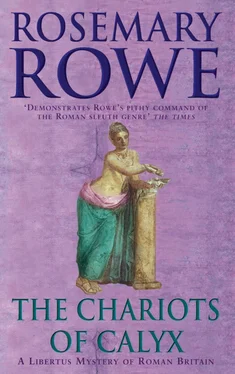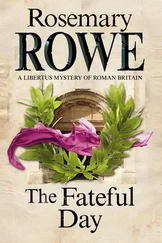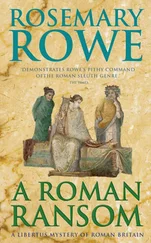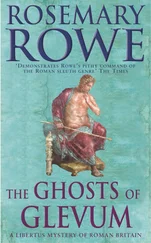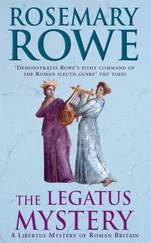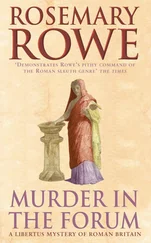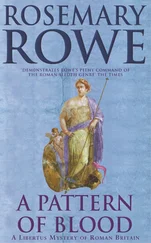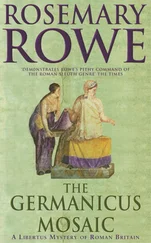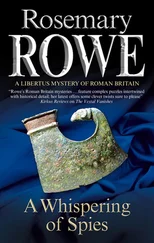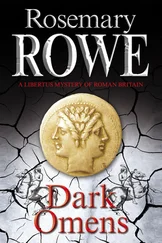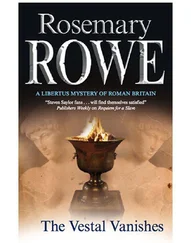Rosemary Rowe - The Chariots of Calyx
Здесь есть возможность читать онлайн «Rosemary Rowe - The Chariots of Calyx» весь текст электронной книги совершенно бесплатно (целиком полную версию без сокращений). В некоторых случаях можно слушать аудио, скачать через торрент в формате fb2 и присутствует краткое содержание. Год выпуска: 2002, ISBN: 2002, Издательство: Headline, Жанр: Исторический детектив, на английском языке. Описание произведения, (предисловие) а так же отзывы посетителей доступны на портале библиотеки ЛибКат.
- Название:The Chariots of Calyx
- Автор:
- Издательство:Headline
- Жанр:
- Год:2002
- ISBN:9781472205087
- Рейтинг книги:5 / 5. Голосов: 1
-
Избранное:Добавить в избранное
- Отзывы:
-
Ваша оценка:
- 100
- 1
- 2
- 3
- 4
- 5
The Chariots of Calyx: краткое содержание, описание и аннотация
Предлагаем к чтению аннотацию, описание, краткое содержание или предисловие (зависит от того, что написал сам автор книги «The Chariots of Calyx»). Если вы не нашли необходимую информацию о книге — напишите в комментариях, мы постараемся отыскать её.
The Chariots of Calyx — читать онлайн бесплатно полную книгу (весь текст) целиком
Ниже представлен текст книги, разбитый по страницам. Система сохранения места последней прочитанной страницы, позволяет с удобством читать онлайн бесплатно книгу «The Chariots of Calyx», без необходимости каждый раз заново искать на чём Вы остановились. Поставьте закладку, и сможете в любой момент перейти на страницу, на которой закончили чтение.
Интервал:
Закладка:
‘Which is?’
‘That denarius you gave me. When I heard that Fortunatus was not racing after all, I bet it on the Reds. You have doubled your money. And you did enjoy the racing.’
There are times when I find it very difficult to be angry with my servant for long. Under the incredulous eyes of the optio , though, I did my best.
Chapter Twelve
Junio was clearly disappointed at being dragged away from the excitement so soon, and perhaps the soldiers were too, but if so they were too well trained to show it. The optio himself was a real racing enthusiast, however, and he proved a positive well of information on the subject.
‘The Blues are staying at a lodging house close to the west gate of the town,’ he told me importantly, as his soldiers forced a way down the thronged hill for us, a violent but highly effective procedure — people were treading on each other to allow us through. Behind us, there was a scuffle as small groups of supporters, all sporting different colours, scrambled frantically for our seats. ‘I could take you there if you wish. Or if you would prefer to go round to the stable enclosure. .?’
That was the obvious choice to me, since that was where the team would be, in preparation for their next race. I was afraid that we might have trouble getting in — members of the public are not usually permitted behind the scenes — but the optio was confident. He led the way unhesitatingly, straight across the circuit, where the slaves were hastily raking the sand back over the clay track. They waited, blank-faced, till we passed and then raked out our footsteps with their own, walking backwards as they worked.
Even so, nobody shouted at us. One or two urchins in the crowd gave us an ironic cheer, but the civic officials in the box ignored us, and when we reached the inner gates they were thrown open for us without question. An armed escort has its uses.
The gates led to a short, dark passageway which opened out into a huge yard, surrounded by stalls and makeshift stabling for horses, and at first sight it appeared to be almost as thronged with people as the stadium itself.
As we came in the eight local chariots were lining up, two-in-hand this time, to take their turn at the racing. Their drivers, resplendent in their uniforms, balanced their precarious vehicles and waited for the signal to enter the stadium. Some were nervously adjusting their helmets or their harness, others steadying their restless horses, while some were trying to dissipate the tension by exchanging jibes and insults.
‘Call yourself a racing driver, Gaius Flaminius? I could overtake you on a pregnant mule!’
The victim of the taunts, a tall thin youth in Green colours, turned as red as his tormentor’s chariot. ‘Is that so, Paulus Fatface? Well, I’ll tell you something. The only reason your horse gallops so fast is to get away from the smell of your feet!’
We left them to their battle of words and went on into the yard beyond.
It was alive with activity. Stable-slaves hurried everywhere: leading horses, carrying buckets, polishing harness, sweeping straw, tripping over their sandals in their haste while their masters shouted and cursed.
In the stalls beyond, the horses that had completed the earlier race were being cared for. A man who was clearly an animal medicus was bandaging the leg of a handsome chestnut with white ribands in its mane, while a nervous-looking slave hovered nearby with salves, just out of reach of the creature’s hooves. You did not have to be a racing man to see what was happening: they were treating one of the horses that had been damaged by pulling the overturned chariot.
I glanced around for the unfortunate driver, and saw him laid out on a shutter in the corner. His face and body were battered and bloody and he was evidently dead. No one paid any attention to him. Nearby, his substitute was already donning his cloak and helmet under the critical eye of a stout man whom I took to be the coach, who was waving his arms in a last-minute demonstration of tactics. The young man was a reserve driver, by the look of it, and nervous at his sudden elevation — his face was so white that he scarcely needed the plume on his headgear to identify his colour.
Each factio clearly had its own quarter of the yard, and, in the nature of these things, Blue was inevitably in the furthest corner. I nodded to the optio , and he led the way. No one questioned us, or even paused in their activity, but I was uncomfortably aware of curious stares following us as soon as our backs were turned. The moment I looked around, however, every man was engaged in his work, eyes fixed firmly ahead of him. These were people who preferred not to meddle with soldiers.
The driver of the Blues, presumably Fortunatus’ replacement, was busily lashing out at a stable-slave as we approached, both with his tongue and with his whip, for giving a hot horse cold water, but on our arrival he stopped his tirade and turned to greet us. ‘You were looking for me, citizen?’ He was a lightly built young man, but strong — the perfect build for a driver — with muscles like whipcord. He was clearly no coward, but at my approach he ran his tongue round his lips like a schoolboy who has failed to prepare his homework.
‘I came,’ I told him, as a murmur from the stadium crowd and the sound of flying hoofbeats told us that the next race had begun, ‘to ask about Lividius Fortunatus. I understand he had an accident?’
I had meant it as the simplest overture, but the effect was dramatic. The tongue flicked out again, and his voice almost failed him. ‘I should be honoured, naturally,’ he managed at last, ‘if in my humble way I could render the remotest service to His Excellence the Governor, but I know nothing about it. I did not see the race at all, so I do not see how I can assist you, citizen.’ There was so much sweat on his face, he looked as if he had been drinking from a street fountain.
When a man grovels like that it usually means, in my experience, that he has something to hide. Also, he is often easy to bully. He had mentioned the governor, and that gave me an advantage. I assumed my most menacing expression.
‘Nonetheless, on behalf of His Excellence Helvius Pertinax, I would like to know. .’ I began, but the words died on my lips. From the recesses of the stall another man had appeared.
This was the Blue team coach, that much was clear from his manner and his dress, and he was as hefty as his driver was slight. He was muscular enough, under his colourful tunic, and had no doubt once been athletic, but now the body was running to fat. Wine and good living had etched the face almost as much as the ugly scar which ran across it from eyebrow to chin — the relic of some ancient shipwreck on the chariots, no doubt. Most trainers have been drivers in their time, some of them ex-slaves from other provinces, and this man had the swarthy skin and dark eyes of a Greek. He hurried towards us courteously enough, but there was no trace of welcome in his eyes.
‘Perhaps I can be of help to you, gentlemen?’ He was having to speak loudly and deliberately to make himself heard. ‘As he told you, our replacement driver did not witness the race. I did. A most unfortunate incident, and terrible for Fortunatus. A tragedy for our factio . I am the team manager, by the way. My name is Calyx.’ He smiled. The corners of his mouth moved reluctantly, as if they were pulled up by strings, and were not used to the exercise. ‘Yes, a tragedy. If it had not been for that, the Blues would almost certainly have won.’
I glanced at the substitute driver. He was mopping his face with the back of his hand, and looking as relieved as any man can look who is about to risk life and limb in a flimsy cockleshell amidst the hooves of thundering horses. The unfortunate slave he had been lambasting, I noticed, had picked up his water bucket and escaped.
Читать дальшеИнтервал:
Закладка:
Похожие книги на «The Chariots of Calyx»
Представляем Вашему вниманию похожие книги на «The Chariots of Calyx» списком для выбора. Мы отобрали схожую по названию и смыслу литературу в надежде предоставить читателям больше вариантов отыскать новые, интересные, ещё непрочитанные произведения.
Обсуждение, отзывы о книге «The Chariots of Calyx» и просто собственные мнения читателей. Оставьте ваши комментарии, напишите, что Вы думаете о произведении, его смысле или главных героях. Укажите что конкретно понравилось, а что нет, и почему Вы так считаете.
